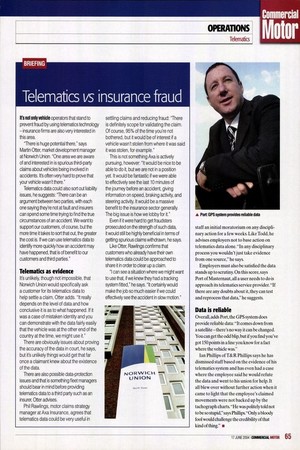; Telematics vs insurance fraud
Page 63

If you've noticed an error in this article please click here to report it so we can fix it.
It's not only vehicle operators that stand to prevent fraud by using telematics technology — insurance firms are also very interested in this area.
"There is huge potential there," says Martin Otter, market development manager at Norwich Union. "One area we are aware of and interested in is spurious third-party claims about vehicles being involved in accidents. It's often very hard to prove that your vehicle wasn't there."
Telematics data could also sort out liability issues, he suggests: "There can be an argument between two parties, with each one saying they're not at fault and insurers can spend some time trying to find the true circumstances of an accident. We want to support our customers, of course, but the more time ft takes to sort that out, the greater the cost is. If we can use telematics data to identify more quickly how an accident may have happened, that is of benefit to our customers and third parties." Telematics as evidence
It's unlikely, though not impossible, that Norwich Union would specifically ask a customer for its telematics data to help settle a claim, Otter adds. "It really depends on the level of data and how conclusive it is as to what happened. If it was a case of mistaken identity and you can demonstrate with the data fairly easily that the vehicle was at the other end of the country at the time, we might use it."
There are obviously issues about proving the accuracy of the data in court, he says, but it's unlikely things would get that far once a claimant knew about the existence of the data.
There are also possible data-protection issues and that is something fleet managers should bear in mind before providing telematics data to a third party such as an insurer, Otter advises. Phil Rawlings, motor claims strategy manager at Axa Insurance, agrees that telematics data could be very useful in
settling claims and reducing fraud: "There is definitely scope for validating the claim. Of course, 95% of the time you're not bothered, but it would be of interest if a vehicle wasn't stolen from where it was said it was stolen, for example."
This is not something Axa is actively pursuing, however: "It would be nice to be able to do it, but we are not in a position yet. It would be fantastic if we were able to effectively see the last 10 minutes of the journey before an accident, giving information on speed, braking activity, and steering activity. It would be a massive benefit to the insurance sector generally. The big issue is how we lobby for it."
Even if it were hard to get fraudsters prosecuted on the strength of such data, it would still be highly beneficial in terms of getting spurious claims withdrawn, he says.
Like Otter, Rawlings confirms that customers who already have their own telematics data could be approached to share it in order to clear up a claim.
"I can see a situation where we might want to use that, if we knew they had a tracking system fitted," he says. "It certainly would make the job so much easier if we could effectively see the accident in slow motion."




























































































































































































